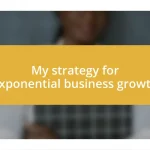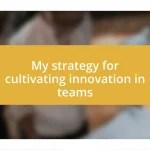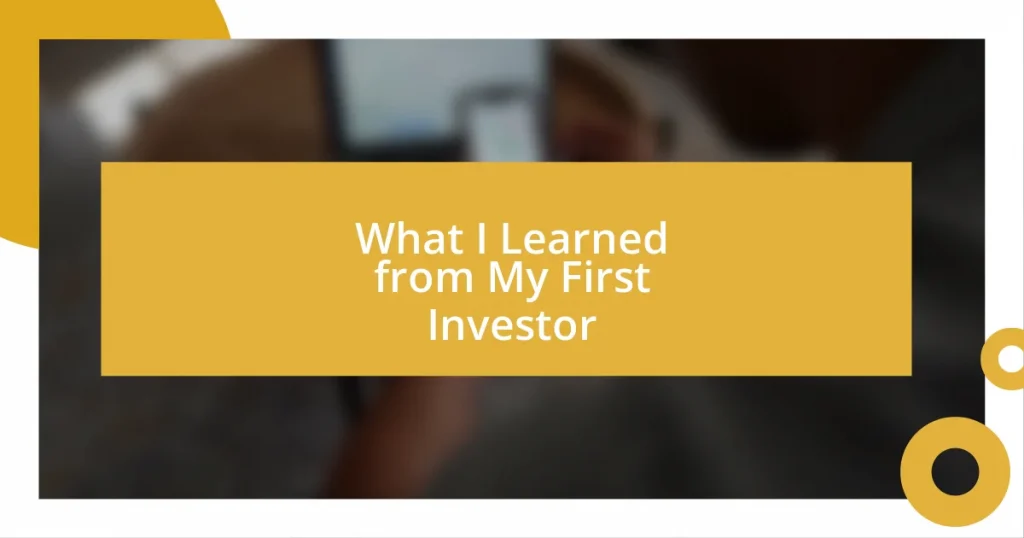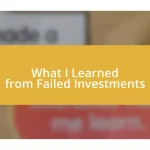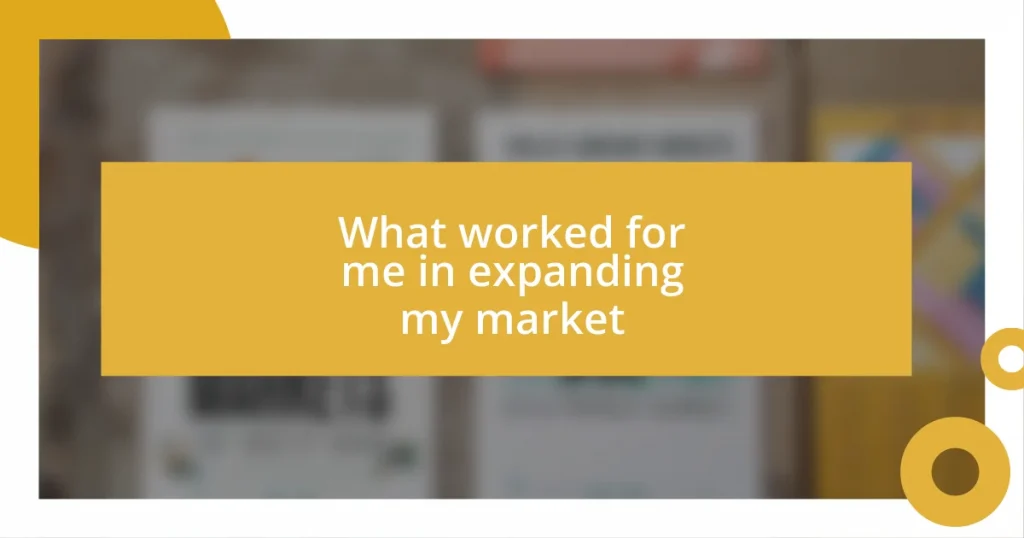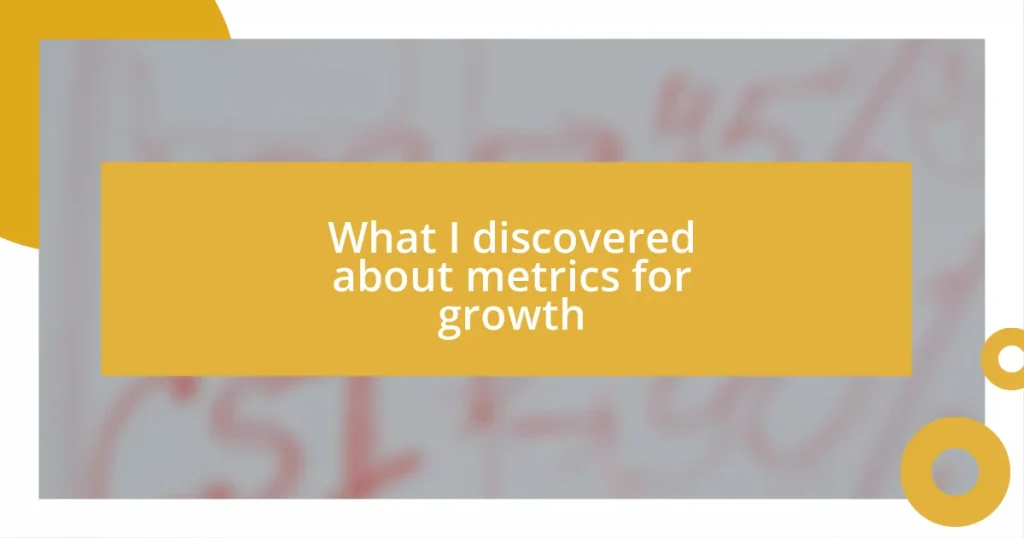Key takeaways:
- Investors offer more than capital; they provide mentorship, critical feedback, and a fresh perspective, which can lead to innovation and growth.
- Establishing trust involves transparent communication, setting realistic expectations, and regularly sharing updates to foster a collaborative relationship.
- Embracing feedback and creating a dialogue for continuous improvement transforms investor relationships, enhancing project outcomes and mutual learning.

Understanding the Role of Investors
Investors are more than just sources of capital; they bring invaluable experience and perspective to the table. I remember my first meeting with an investor who challenged my business model, pushing me to think critically about my approach. It made me realize that their role is not solely about funding, but also about mentoring and guiding entrepreneurs on their journey.
When I finally secured funding, it felt like a milestone. But I quickly discovered that maintaining a relationship with my investor required transparency and communication. How do you ensure that your investor feels involved yet not overbearing? Balancing this dynamic was critical for me; it meant being open about setbacks and learning how to celebrate the small wins together.
I’ve learned that a good investor also acts as a sounding board for ideas. One afternoon, I shared a concept I believed in wholeheartedly. The feedback I received shaped my project in unexpected ways, proving that constructive criticism can often lead to breakthrough moments. Have you ever considered how a fresh perspective could transform your vision? Engaging with an investor can be a catalyst for growth, sparking innovation that you might never have contemplated alone.

Key Lessons from Early Meetings
Early meetings with my first investor taught me the importance of preparation. I vividly recall an occasion when I walked into a meeting unsure about my financial projections. The investor noticed my hesitance and asked one simple question: “How did you arrive at these numbers?” It was a wake-up call. I was unprepared, and it showed. This experience drove home the necessity of doing my homework and being ready to defend every aspect of my business plan confidently and thoughtfully.
Another significant lesson was the value of active listening. In my first few meetings, I was so focused on delivering my pitch that I barely absorbed the investor’s feedback. Reflecting on those experiences now, I realize that my investor had a wealth of knowledge. Their insights could have saved me from making early mistakes if I had listened more intently. This shift in mindset helped me to view meetings not just as a chance to sell my vision, but as a dialogue. Have you ever felt that urge to dominate the conversation? Sometimes, stepping back can yield greater rewards than you think.
The discussions about risk also stood out to me. There was a moment when my investor pressed me on what could go wrong with my startup. Initially, I felt defensive, but then I realized how crucial it was to address these risks head-on. I learned that acknowledging challenges demonstrates confidence and prepares you better for unforeseen circumstances. It’s not about ignoring risks, but rather understanding and managing them. Can you recall a time when facing your fears led to unexpected clarity?
| Lesson | Insight |
|---|---|
| Preparation | Be ready to explain your financial data; confidence is key. |
| Active Listening | Engage in a dialogue, value feedback, and adapt your approach. |
| Addressing Risk | Acknowledge challenges openly to prove confidence and foresight. |

Building Trust with Your Investor
Building trust with your investor is a nuanced process that goes beyond just financial transactions. I remember sharing a particularly rough month’s revenue figures during a quarterly update. Instead of sugarcoating the situation, I laid everything bare, explaining the challenges we faced. To my surprise, my investor appreciated my honesty and offered helpful strategies rather than criticism. This taught me that vulnerability can actually build trust, fostering a partnership rooted in respect and understanding.
To strengthen the relationship further, here are some practical ways to establish trust:
– Communicate Regularly: Share updates, whether good or bad. Frequent check-ins keep the investor informed and engaged.
– Set Realistic Expectations: Transparency about what they can realistically expect from your business cultivates confidence in your leadership.
– Seek Feedback: Actively asking for their input shows you value their experience and perspective, reinforcing their role as a partner.
– Honor Commitments: Following through on promises builds credibility and shows you’re serious about your business.
– Celebrate Milestones Together: Sharing your wins, however small, creates a sense of shared ownership and joy in the success of the venture.

Setting Clear Expectations and Goals
When it came to setting clear expectations and goals with my first investor, I discovered early on that clarity is essential. There was a moment when we mapped out the financial milestones for the year; I thought I had communicated my vision well, but my investor’s puzzled expression told me otherwise. Have you ever felt that disconnect? I realized then that without precise targets, even the best ideas can get lost in translation.
As we continued our discussions, I learned the importance of aligning goals between both parties. One time, I confidently presented my growth projections, only to find out they didn’t match what my investor envisioned. It was a pivotal lesson. I understood that by involving my investor in the goal-setting process, we could not only foster collaboration but also share accountability. This dual ownership of our targets brought us closer together and ensured we were marching to the same beat.
I found that revisiting our goals regularly kept us both on track. There were weeks when I felt we were moving too slow, and addressing these concerns openly made all the difference. It’s vital to ensure that both you and your investor can recalibrate expectations as needed. Have you ever recalibrated a plan when things didn’t go as expected? This practice not only helped us stay focused but also made my investor feel valued and heard, transforming our partnership into a true collaboration.

Managing Investor Relationships Effectively
Managing investor relationships effectively requires proactive engagement and open lines of communication. I remember a time when I faced a major setback with a product launch. Instead of waiting for my investor to hear the news through external sources, I opted to bring it up immediately during our scheduled call. I could sense my investor’s relief when I laid everything out—it transformed our communication from one-sided updates to a more interactive dialogue. Have you ever had to share news you were dreading? That experience taught me that facing challenges head-on can encourage trust and honesty in our relationship.
Another key aspect is to value your investor’s insights, especially when navigating tough decisions. I recall a moment when I was torn between two different strategies for scaling our operations. Sharing my thought process with my investor not only opened a wealth of ideas but also made her feel integral to the decision-making process. Have you found that discussing options can strengthen your bond with your investor? Their experiences can offer fresh perspectives that you might not consider alone, creating a richer tapestry of options to explore together.
Lastly, I learned that consistency in my updates truly nurtured our relationship. Initially, I would send sporadic emails, and while they contained important information, they lacked a rhythm. I decided to implement a regular monthly newsletter, where I share insights into our progress and any brewing challenges. This shift fostered a sense of anticipation and connection. Have you noticed how routine can deepen relationships? Over time, I felt my investor became more engaged, often responding with ideas and encouragement. It was a valuable reminder that managing an investor relationship isn’t merely about accountability; it’s about creating a collaborative, ongoing conversation.

Applying Feedback for Future Success
Feedback is a powerful tool, and I’ve learned to embrace it for future success. For instance, after one particularly challenging meeting, my investor pointed out that my pitch lacked clarity on the market opportunity. At first, I felt defensive—who wouldn’t? But taking a step back, I realized that this criticism was invaluable. It prompted me to refine my message, and the next time I presented, the difference was palpable. Have you ever felt that sting of feedback only to uncover a gem of insight beneath it?
Implementing feedback isn’t just about adjusting pitches; it extends to refining strategies as well. I recall a time when my investor suggested I pivot our marketing approach based on changing customer behaviors. Initially hesitant, I chose to test his advice on a small scale. To my surprise, the results were fantastic! This experience taught me the immense value of being receptive and adaptable. Have you ever hesitated to change course, only to discover that it was the best decision you could make?
Ultimately, I found that creating a feedback loop with my investor transformed our collaboration. After every project or milestone, I would set aside time to reflect on what went well and what could be improved—essentially, a mini-review. Sharing these reflections with my investor fostered an ongoing dialogue about growth. I felt empowered knowing we were both committed to learning and evolving together. Does this kind of feedback exchange resonate with your own experiences? It’s been a game-changer for me, ensuring that each hurdle becomes a stepping stone towards success.





